As a holistic veterinarian, I’ve had the pleasure of meeting many wonderful Borzoi dogs. These elegant canines, known for their grace and speed, are truly a sight to behold. But as a Borzoi parent, you’re probably aware that these beautiful creatures can sometimes face specific health issues – especially when it comes to their eyes. That’s why I’ve decided to focus on Borzoi Eye Health in today’s discussion.
Over the years, I’ve seen a variety of eye problems in this breed, from minor irritations to more serious conditions. Understanding the unique structure of Borzoi eyes, the common issues they face, and how to prevent and treat these problems is key to ensuring your pet’s vision remains sharp.
From holistic diet tips and environmental hygiene measures to routine eye care and maintenance, I’ll be sharing some of my top tips and advice on how to keep your Borzoi’s eyes healthy. And remember, while this advice is tailored specifically for Borzoi, much of it can be applied to other breeds too. Whether you’re a seasoned Borzoi parent or considering adopting one, I hope you’ll find this information helpful for ensuring your dog’s eyes stay as bright and clear as their personality.
So, let’s get started on our journey into understanding and improving Borzoi Eye Health.
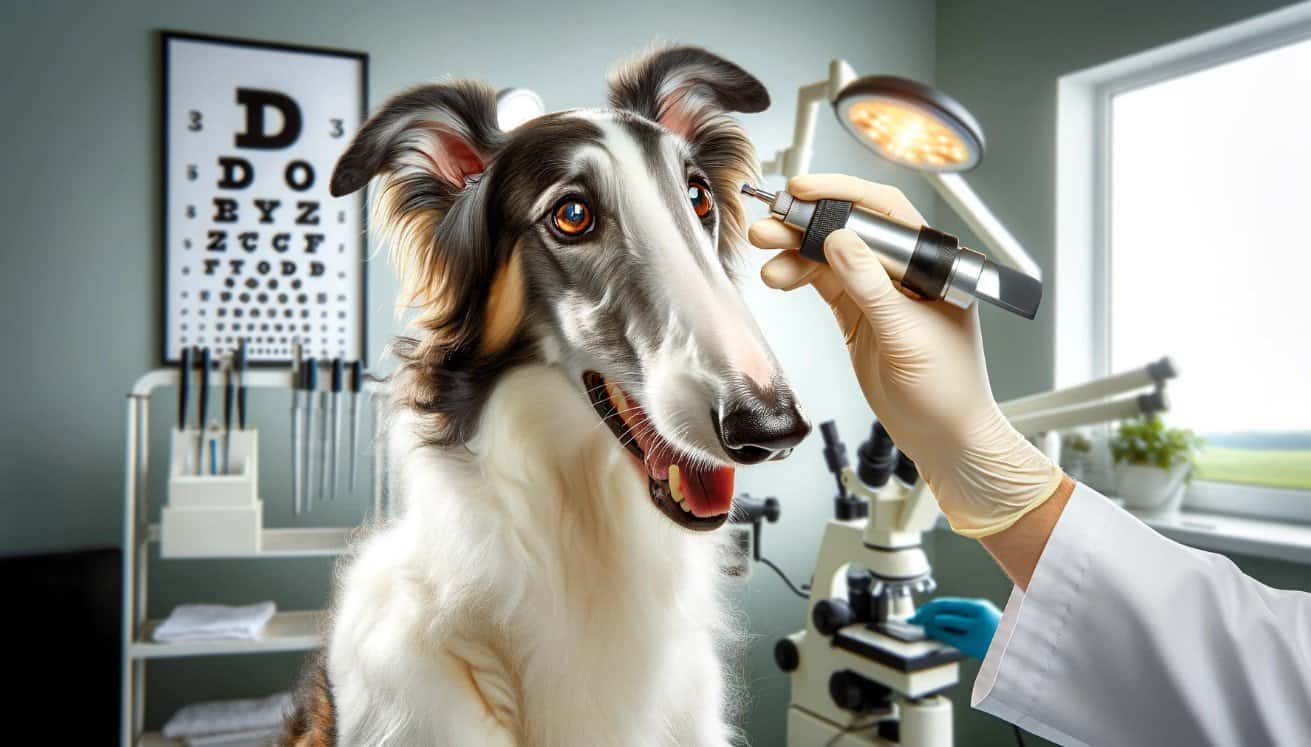
Understanding Breed Specific Eye Structure
If you’re a proud Borzoi parent, gaining knowledge about your elegant pet’s unique eye structure can be a game-changer for ensuring their long-term eye health. The Borzoi breed, with its distinct almond-shaped eyes, has a unique eye structure that is both beautiful and a bit more susceptible to certain conditions.
Borzois have what are known as sighthound eyes. These eyes are set obliquely in the skull, meaning they are angled rather than round. This gives them a wider field of vision, which was beneficial for their hunting ancestors. Their eyes are also larger compared to other breeds, again contributing to their superior sight. However, these characteristics can make them more prone to eye problems.
An important aspect of the Borzoi’s eye structure is the third eyelid, or nictitating membrane. This is a protective layer that helps keep the eyes moist and removes debris. However, it can also be a site for certain eye issues, such as cherry eye, where the gland of the third eyelid prolapses, causing a red, swollen appearance.
The cornea, the clear front surface of the eye, is another vital aspect of the Borzoi’s eye structure. It’s responsible for the majority of the eye’s optical power, but its exposed position makes it susceptible to injuries and diseases, such as corneal ulcers.
The lens, located behind the cornea, focuses light on the retina, which sends the image to the brain. Cataracts, a common eye condition in Borzois, occurs when the lens becomes cloudy, affecting vision.
Lastly, let’s not forget the importance of eyelashes in a Borzoi’s eye health. These long, elegant lashes do more than just enhance their beauty. They play a crucial role in shielding the eyes from dust and debris.
Understanding these facets of your Borzoi’s eye structure is the first step in recognizing potential problems and seeking timely veterinary care. Remember, knowledge is power, and in this case, it can be the key to your Borzoi’s eye health.
Common Eye Issues In Borzoi
As a veterinarian, I’ve seen a number of eye issues that can afflict the Borzoi breed. These dogs are known for their keen vision, but that doesn’t mean they’re immune to eye health problems. I want to help you keep your Borzoi’s eye health in top shape, so let’s discuss some of the most common conditions and their symptoms.
Progressive Retinal Atrophy (PRA) is a genetic condition that can cause gradual loss of vision in Borzois. This disease usually starts with night blindness and progresses to total blindness over time. Symptoms to look for include:
- Difficulty navigating in low light
- Clumsiness or bumping into objects
- Dilated pupils that don’t respond well to light
Cataracts are another common issue in Borzois. These can cause cloudiness in the eye lens, leading to impaired vision. While cataracts can develop due to age, they can also be a result of diabetes, eye trauma, or a nutritional deficiency. Symptoms of cataracts include:
- Cloudy, foggy, or bluish discoloration in the eye
- Difficulty with vision, especially in bright light
- Bumping into objects or difficulty navigating
Corneal Dystrophy is an inherited condition that affects the Borzoi’s cornea, causing it to become opaque. This can lead to vision loss if left untreated. Signs of corneal dystrophy include:
- White or grayish spots on the cornea
- Cloudiness in the eye
- Excessive tearing or squinting
Lastly, Entropion is a condition where the eyelid rolls inward, causing the eyelashes to rub against the cornea. This can cause discomfort, redness, and potentially lead to corneal ulcers. If you notice your Borzoi squinting, tearing excessively, or rubbing their eyes frequently, it might be due to entropion.
Remember, early detection is key when it comes to treating any of these conditions. Regular check-ups and monitoring your Borzoi’s eye health can help prevent serious vision problems. If you notice any changes in your Borzoi’s eyes or behavior, don’t hesitate to reach out to your vet.
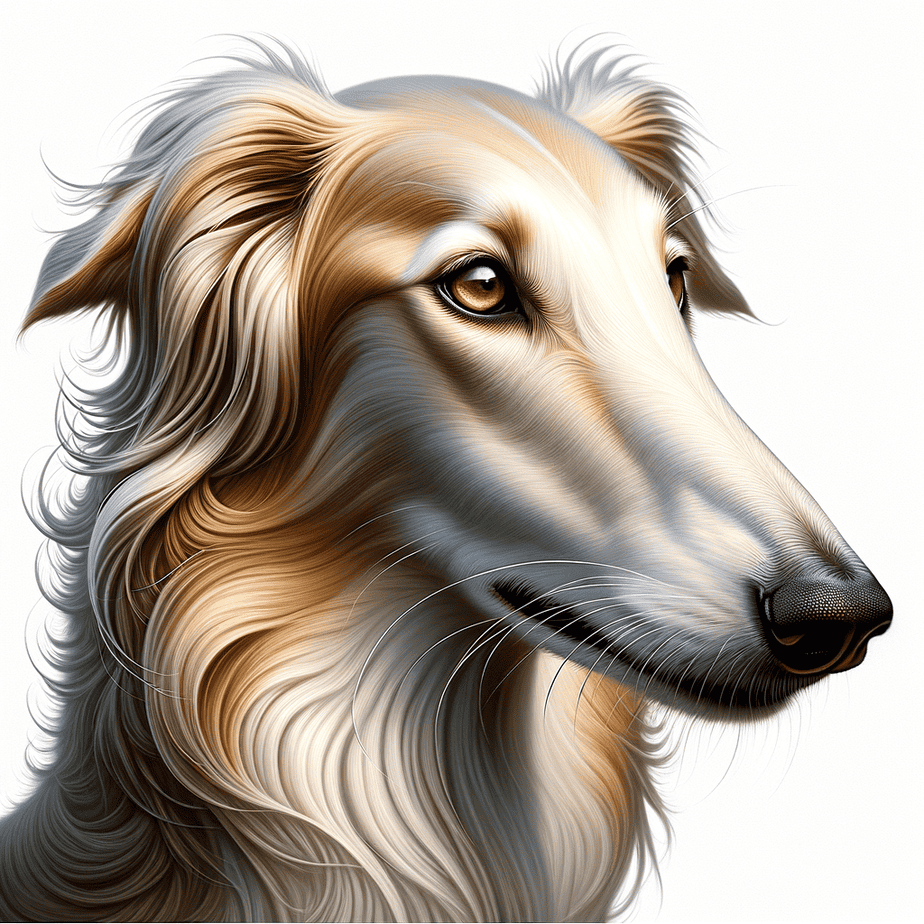
Prevention of Eye Problems in Borzoi
Ensuring your Borzoi gets the right nutrients for optimal eye health is essential for maintaining clear vision and preventing age-related issues. Natural, nutrient-rich foods and supplements can play a key role in supporting their eyesight. From vitamin A-packed freeze-dried liver treats to antioxidant-rich blueberries and targeted supplements like Eyeplex by Standard Process, there are several ways to nourish your dog’s eyes. In this section, we’ll explore how these powerful ingredients contribute to long-term vision health and overall well-being.
Eyeplex by Standard Process
Eyeplex by Standard Process is a specialized supplement designed to support your Borzoi’s eye health with a blend of essential nutrients. Formulated with key vitamins, minerals, and antioxidants, Eyeplex helps protect against oxidative stress, supports retinal function, and promotes overall vision health. Ingredients like vitamin A, vitamin C, and zinc contribute to maintaining strong eyesight, while whole food ingredients provide additional phytonutrients for cellular protection. Adding Eyeplex to your Borzoi’s diet can be especially beneficial for aging dogs or breeds prone to eye conditions, offering targeted nutritional support to keep their vision sharp and healthy for years to come.
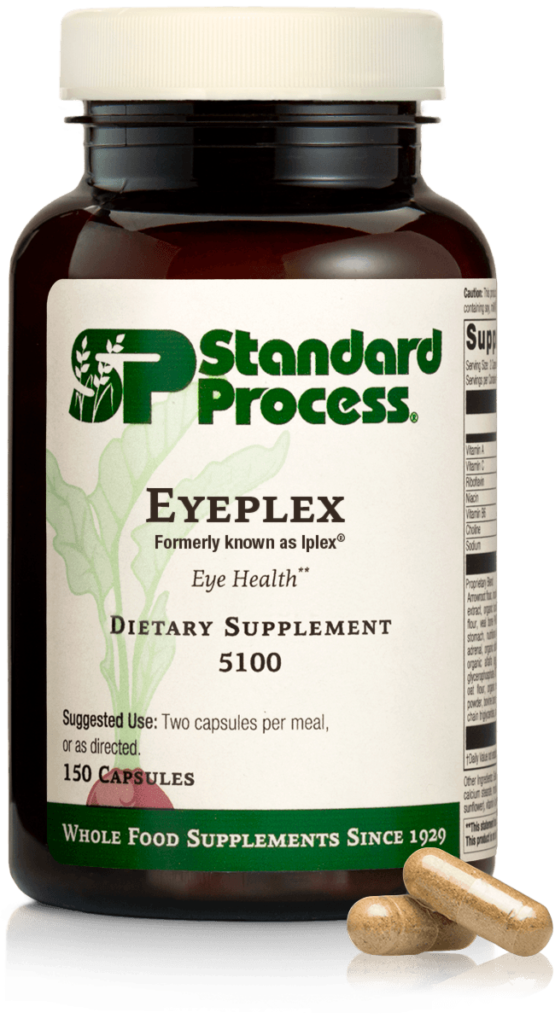
Freeze-Dried Blueberries
Freeze-dried blueberries are a powerhouse of antioxidants that can help protect your Borzoi’s eyes from oxidative stress and age-related damage. Rich in vitamins C and E, as well as anthocyanins, these tiny but mighty berries help combat free radicals that can contribute to eye diseases like cataracts and macular degeneration. Incorporating freeze-dried blueberries into your dog’s diet provides a natural and delicious way to support retinal health, reduce inflammation, and promote overall vision longevity. Plus, they’re a low-calorie, dog-friendly treat that makes a great addition to a balanced diet for long-term eye health.
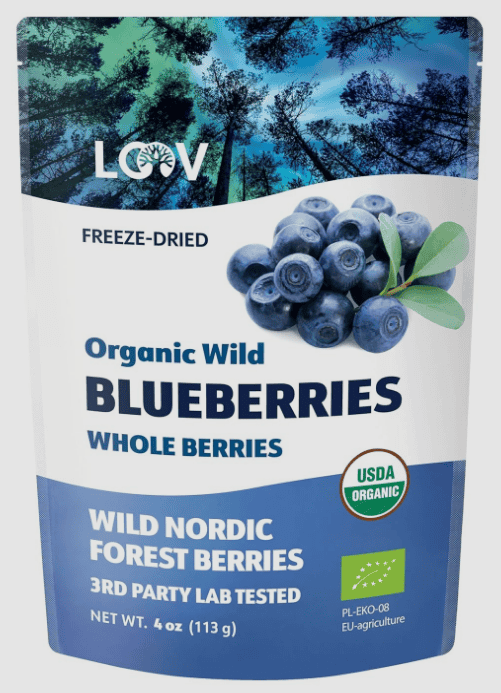
Freeze-Dried Liver
Freeze-dried liver treats are an excellent natural source of vitamin A, an essential nutrient for your Borzoi’s eye health. Vitamin A plays a crucial role in maintaining good vision, especially in low-light conditions, while also supporting overall immune function and skin health. Since liver is rich in bioavailable vitamin A, incorporating freeze-dried liver treats into your dog’s diet provides a convenient and nutritious way to promote optimal eye function. Just be sure to feed them in moderation, as excessive vitamin A can lead to toxicity. Adding these nutrient-packed treats to your pup’s routine is a simple, tasty way to support their long-term vision and well-being!
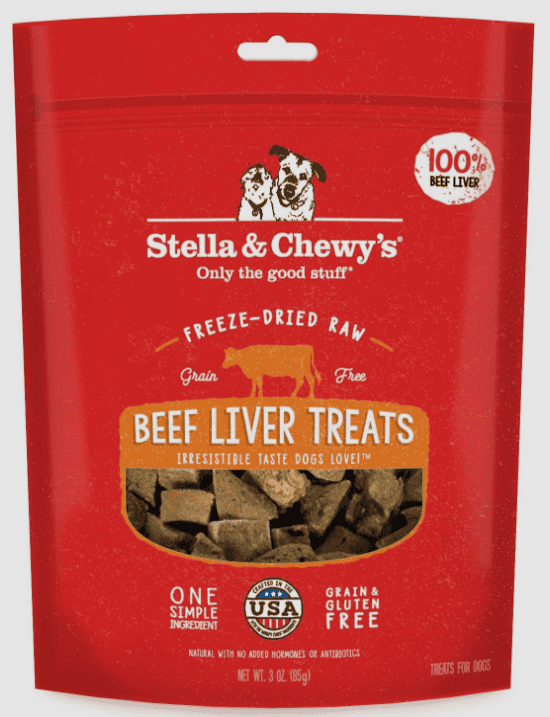
By prioritizing your Borzoi’s eye health through a balanced diet and nutritional supplements, you can help prevent many common eye issues. These simple steps can go a long way in ensuring your pup’s eyes stay healthy and clear for years to come.
Remember, your Borzoi’s eyes are windows to their health. By taking preventative measures, you can help ensure your furry friend enjoys a life full of clear, vibrant sights.
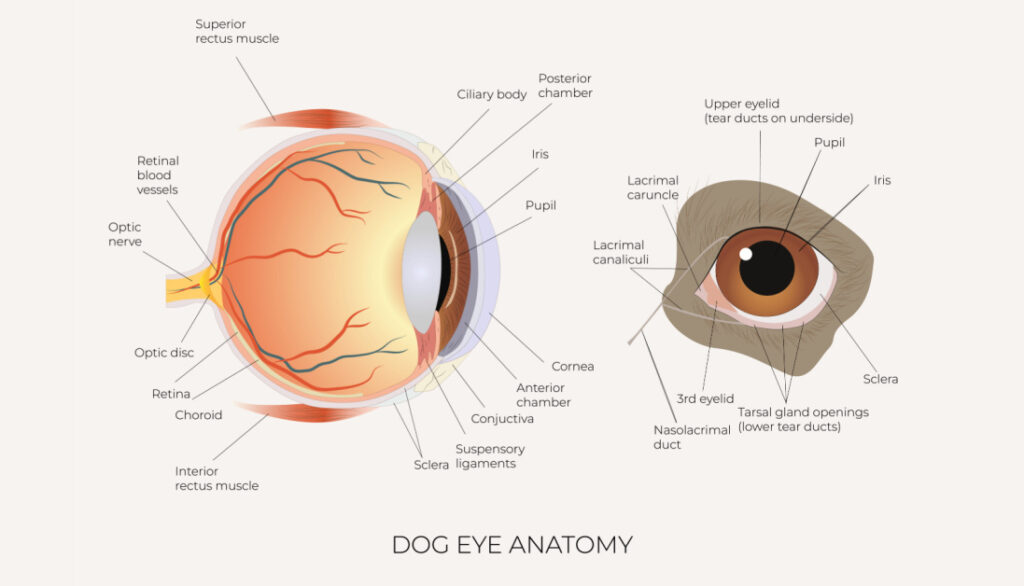
Environmental Hygiene To Reduce Eye Problems
As a loving Borzoi parent, you’re already aware of the importance of a healthy diet and regular check-ups for your dog’s overall health. But did you know that maintaining a clean and safe environment is just as crucial, especially when it comes to your Borzoi’s eye health? Let’s explore some ways to ensure your home environment is helping, not hindering, your Borzoi’s vision.
Indoor Air Quality
Indoor air quality can have a significant impact on your Borzoi’s eye health. Poor air quality can lead to dryness, irritation, and other eye problems. Here are a few steps you can take to improve the air quality in your home:
- Regularly clean and vacuum your home to reduce dust and allergens.
- Consider using an air purifier to filter out irritants.
- Keep windows open when possible to allow fresh air in.
- Avoid smoking indoors as tobacco smoke can irritate your Borzoi’s eyes.
Sprays, Diffusers, Candles, Incense
While we all love a good-smelling home, some common household items can be harmful to your Borzoi’s eyes. Products like air fresheners, diffusers, candles, and incense can release chemicals and particles into the air that can cause eye irritation or even lead to more serious eye conditions. Here’s how you can limit their impact:
- Avoid using these products in the same room as your Borzoi.
- Opt for natural, unscented products when possible.
- Ensure your home is well-ventilated when using these products.
Remember, your Borzoi’s eyes are sensitive and delicate. Anything that can irritate your eyes can likely irritate theirs too. By maintaining a clean, safe, and healthy environment, you’re doing your part in protecting your Borzoi’s eye health. It’s all part of the journey of being a responsible and caring Borzoi parent!
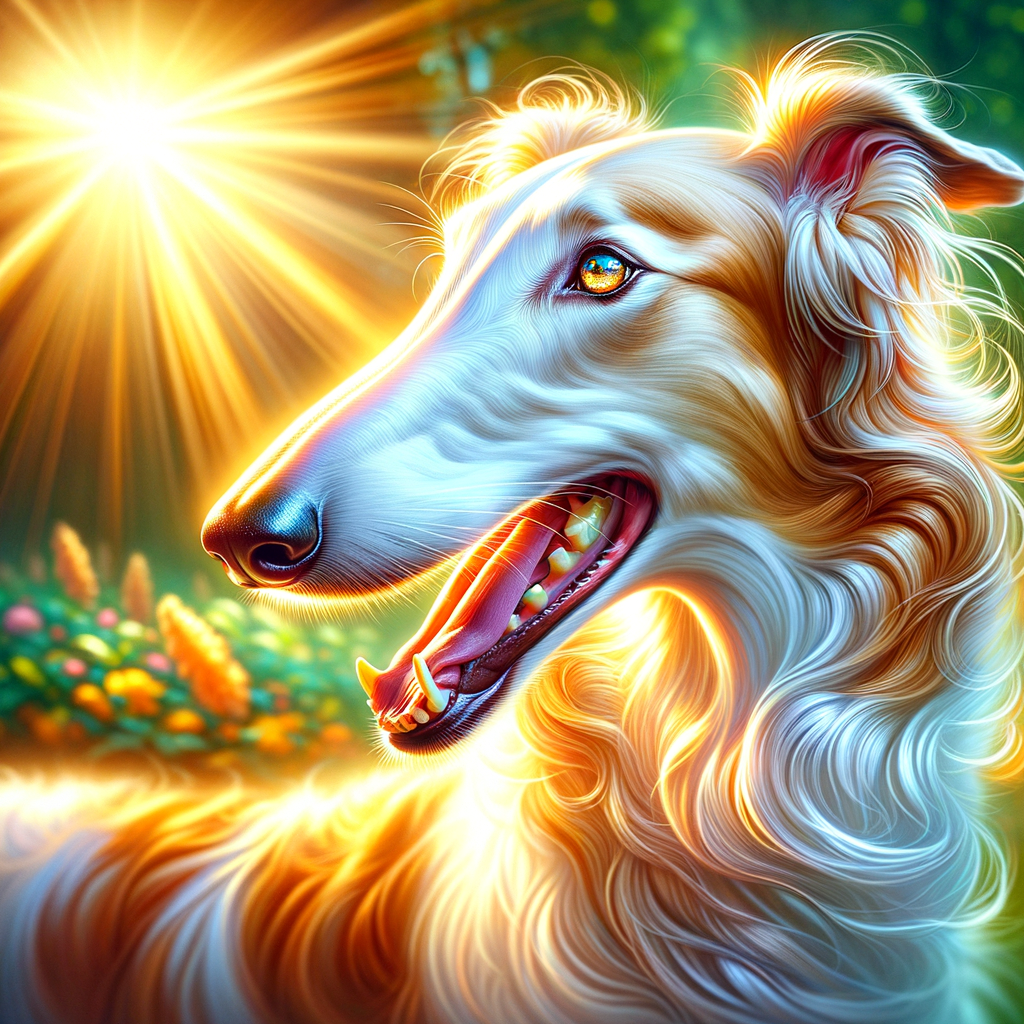
Routine Borzoi Eye Care & Maintenance
As pet parents, we’re tasked with the vital responsibility of ensuring our Borzoi’s eyes are healthy and free from disease. Regular eye care is crucial for maintaining your Borzoi’s eye health and preventing potential issues. Here are some steps you can take:
Daily & Weekly Care & Maintenance
On a daily basis, take the time to observe your Borzoi’s eyes. Check for signs of redness, cloudiness, or discharge. If any of these symptoms are present, it could indicate an underlying issue that needs veterinary attention. Also, look for any changes in your dog’s behavior that might suggest a vision problem, such as bumping into furniture or difficulty finding toys.
Every week, clean your Borzoi’s eyes gently with a soft, damp cloth. Be careful not to touch the eyeball directly. You can use a saline solution or a vet-approved eye cleaner to gently remove any debris or discharge. This can help prevent infections and keep your Borzoi’s eyes bright and clear.
Monitor Hair Length, Nail Length, and Bath Frequency
Your Borzoi’s hair and nails can also impact their eye health. Long hair can fall into the eyes, causing irritation and potential harm. Regularly trim the hair around your Borzoi’s eyes to prevent this. Be careful not to cut too close to the eye, and consider getting professional grooming if you’re unsure.
Long nails can scratch the eyes, especially if your Borzoi tends to paw at their face. Regular nail trims can prevent this risk. Aim for a nail trim every 3-4 weeks, or as advised by your vet.
Bathing your Borzoi can also affect their eye health. If shampoo or soap gets into their eyes, it can cause irritation. Always avoid the eye area when bathing your Borzoi, and consider using a tear-free dog shampoo for added protection.
Incorporating these practices into your regular pet care routine can go a long way in maintaining your Borzoi’s eye health. Remember, early detection and prevention are key to avoiding serious eye conditions. Always consult with your vet if you notice any changes in your Borzoi’s eyes. They can provide the best advice and treatment options tailored specifically to your Borzoi’s needs.
Frequently Asked Questions
- What are common eye conditions in Borzois? Common eye conditions in Borzois include cataracts, progressive retinal atrophy (PRA), entropion, and ectropion.
- How can I prevent eye problems in my Borzoi? To prevent eye problems in your Borzoi, regular veterinary check-ups are essential. Additionally, keeping their eyes clean and free from debris, avoiding exposure to irritants, and providing a balanced diet can help maintain good eye health.
- What are the symptoms of eye conditions in Borzois? The symptoms of eye conditions in Borzois may include redness, excessive tearing, squinting, cloudiness or opacity in the eyes, frequent blinking, sensitivity to light, and changes in vision.
- Can eye conditions in Borzois be treated? Yes, many eye conditions in Borzois can be treated. The treatment options depend on the specific condition and its severity, and may include medications, surgery, or other interventions recommended by a veterinarian.
- When should I seek veterinary care for my Borzoi’s eye problems? If you notice any signs of eye problems in your Borzoi, it is important to seek veterinary care promptly. Early detection and treatment can help prevent further complications and preserve your dog’s vision.
